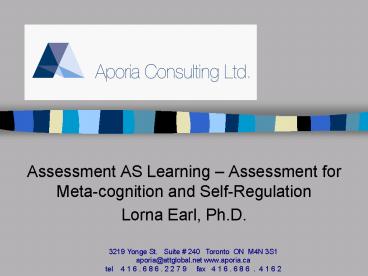Assessment AS Learning Assessment for Metacognition and SelfRegulation - PowerPoint PPT Presentation
1 / 34
Title:
Assessment AS Learning Assessment for Metacognition and SelfRegulation
Description:
Assessment AS Learning Assessment for Meta-cognition and Self-Regulation. Lorna Earl, Ph.D. ... Wine Aroma. Pause for Thought ... – PowerPoint PPT presentation
Number of Views:77
Avg rating:3.0/5.0
Title: Assessment AS Learning Assessment for Metacognition and SelfRegulation
1
- Assessment AS Learning Assessment for
Meta-cognition and Self-Regulation - Lorna Earl, Ph.D.
- Yonge St. Suite 240 Toronto ON M4N 3S1
- aporia_at_attglobal.net www.aporia.ca
- tel 4 1 6 . 6 8 6 . 2 2 7 9 fax 4 1 6 .
6 8 6 . 4 1 6 2
2
Setting the Stage
- I look at losing as research, not failure.
- Billie-Jean King (tennis star)
3
- For students to be able to improve, they must
develop the capacity to monitor the quality of
their own work during actual production. This in
turn requires that students possess an
appreciation of what high quality work is, that
they have the evaluative skill necessary for them
to compare with some objectivity the quality of
what they are producing in relation to the higher
standard, and that they develop a store of
tactics or moves which can be drawn upon to
modify their own work. - Sadler, 1989
4
- The student knows more than the teacher about
what and how he has learned even if he knows
less about what was taught. - Elbow
5
Meta-cognition and Self-Regulation
- Human beings can
- reflect on their own thinking processes through
internal conversations monitoring their own
understanding, predicting their performance,
deciding what else they need to know, organizing
and reorganizing ideas, checking for consistency
between different pieces of information and
drawing analogies that help them advance their
understanding. - can stand back, monitor activities and make
significant conscious and deliberate choices
about their beliefs and their behaviour -
learning and altering their responses based on
new ideas or understanding.
6
Conceptual change
- Rather than transforming evidence that exists in
the world to fit established mental structures
(conceptions), the mental structures themselves
shift (or accommodate) to take new evidence into
account.
7
Becoming Meta-cognitive
- Like all complex learning, self-regulation
requires years of practice, concentration, and
coaching. It does not have a beginning and an
end but rather continues to develop and to be
honed across disciplines and contexts (Costa,
2006). - And, it doesnt happen by chance. If students
are to become meta-cognitive thinkers and problem
solvers who can bring their talents and their
knowledge to bear on their decisions and actions,
they have to develop these skills of
self-assessment and self-adjustment, so that they
can manage and control their own learning.
8
Organizer
- Idea
- Examples
- Questions
9
Rich Assessment Task
10
Example
- The Pool Table Task
11
Pause for Thought
- What mathematical content knowledge did this
teacher need to have to design this task? To
learn from this task? - What are the patterns of prior learning that he
would be looking for in his students thinking?
12
Fostering Meta-cognition (Earl, 2003)
- Habits of Mind for Self-Regulated Thinking
- Examples of What Good Work Looks Like
- Real Involvement and Responsibility
- Targeted Feedback
- Discussion, Challenge and Reflection
- Practice, Practice, Practice
- An Environment of Emotional Safety
13
Habits of Mind for Self-Regulated Learning
14
Self Regulation Questions (for students and
teachers)
- Am I aware of my own thinking about what I am
trying to accomplish? - Have I made a plan for what I want to accomplish?
- Have I collected all the resources for what I
want to accomplish? - Am I aware of how well I am doing and if I need
to change any of my actions or attitudes? - Am I evaluating how well this is going and what I
would do differently next time?
15
What Good Work Looks Like
16
Science Exemplar
17
Comprehension (Reading to Learn) Grades 3 -
6 (Figure 2)
elements of text
Text Awareness
cause effect
compare contrast
predicting
sequencing
hypothesizing
drawing conclusions
Thinking Skills
evaluating
attributing
inferring
brainstorming
grammatical structure
summarizing
Automaticity
organizing information
classifying
Orthographic Knowledge
Semantic
technical vocabulary
background knowledge
word patterns
18
Wine Aroma
19
Pause for Thought
- What knowledge and resources do you need to
design high quality assessment tasks that make
student learning visible and move their learning
forward?
20
Real Involvement and Responsibility
21
Example
- Student led parent conference
22
Pause for Thought
- How did this teacher scaffold students
meta-cognition? - What were the students responsibilities?
- Who else had responsibility?
23
Targeted Feedback
24
"Closing the Gap Prompts" (adapted from Clarke,
2001)
25
Pause for Thought
- How do you intentionally plan and target various
levels of feedback based on assessment of student
thinking?
26
Discussion, Challenge and Reflection
27
Practice, Practice, Practice
28
Senior Science Questioning
29
Senior Science Questioning
- How are these students practicing self-reflection
and self-regulation?
30
An Environment of Emotional Safety
31
Making the Change
- Changing Minds
- Schools are for learning
- Assessment is a significant part of learning
- Changing Practices
- Learning at the core
- Teaching each student just in time to maximise
learning and minimise misconceptions - Feedback for learning
- Communication to ourselves, to students, to
parents, to the community
32
If its not about learning, what should it be
about?
- In a fast changing world, if you cant learn,
unlearn and relearn, youre lost. Sustainable and
continuous learning is a given of the
twenty-first century. - Stoll, Fink and Earl (2003)
33
- If you make a change and it feels comfortable,
you havent made a change. - Lee Trevino
34
- Never doubt that a small group of thoughtful and
committed citizens can change the world. In
fact, it has never happened any other way. - Margaret Mead































